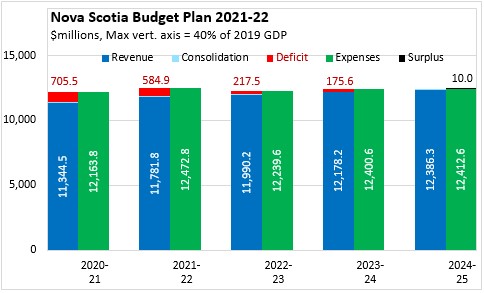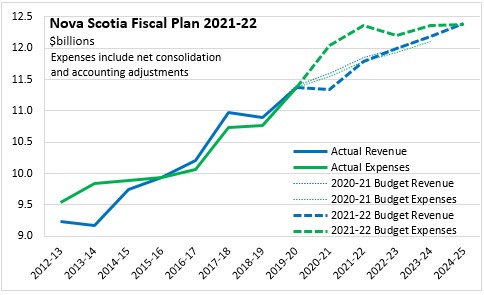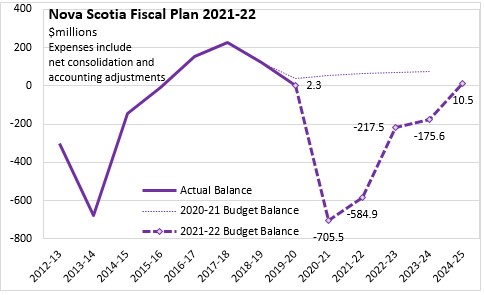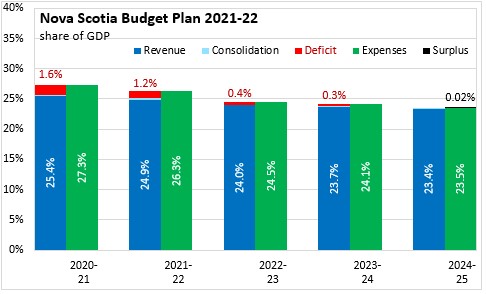The Economics and Statistics Division maintains archives of previous publications for accountability purposes, but makes no updates to keep these documents current with the latest data revisions from Statistics Canada. As a result, information in older documents may not be accurate. Please exercise caution when referring to older documents. For the latest information and historical data, please contact the individual listed to the right.
<--- Return to Archive
For additional information relating to this article, please contact:
March 26, 2021NOVA SCOTIA BUDGET 2021-22 Nova Scotia has tabled its 2021-22 Budget, including a $584.9 million deficit on revenues of $11.782 billion and expenditures of $12.473 billion along with consolidation adjustments of $106.1 million. This follows from a forecast deficit of $705.5 million for the 2020-21 fiscal year. Over the course of the subsequent three fiscal years, Nova Scotia's deficit is projected to narrow, resulting in a surplus of $10 million in 2024-25.

The fiscal plan presented in the 2020-21 Nova Scotia budget was prepared before the COVID-19 pandemic. As a result of the pandemic, Nova Scotia's expenditures have been revised up over the fiscal planning horizon. Revenues were revised down in the near term, but return closer to previous assumptions in the medium term.

As a result of the pandemic's impacts on the economy, revenues and expenditures, Nova Scotia's projections of small surpluses have been revised. The deficit is forecast to peak in 2020-21 at $705.5 million before declining to $584.9 million in 2021-22, $217.5 million in 2022-23 and $175.6 million in 2023-24. In 2024-25, the Nova Scotia fiscal plan projects a surplus of $10.5 million.

With a decline in nominal GDP in 2020, the Nova Scotia government's footprint in the economy amounted to 27.3% of provincial GDP in 2020-21. As nominal GDP recovers after the pandemic, this proportion is projected to decline - falling to 23.5% by 2024-25.
Nova Scotia's net debt is forecast to have risen to 37.4% of GDP in 2020-21. In 2021-22 this is projected to rise to 37.9%. In the subsequent three fiscal years, Nova Scotia's debt is projected to rise to 40.1% of GDP (including the impact of larger capital expenditures).

Although Nova Scotia's cases of COVID-19 were lower than in most other parts of the country, there were still significant economic shocks from measures taken to contain outbreaks. Real GDP is forecast to be down by 5.3% in 2020 (-4.2% in nominal terms). By early 2021, Nova Scotia's employment had largely recovered, though there remain employment losses for some industries (accommodation/food, arts/recreation, manufacturing, retail) as well as demographic groups (youth, those with less education). The economic assumptions for 2021 include additional restriction periods to account for any possible further outbreaks or restrictions. With rollout of vaccines expected to be largely accomplished by the second half of the year, most industries are expected to be returning to 'normal' production levels. The exceptions are tourism-related industries where a slower recovery is projected. Nova Scotia's real GDP is projected to rebound with gains of 4.6% in 2021 and 3.4% in 2022. Nominal GDP is projected to grow by 6.2% in 2021 and by 5.5% in 2022. In the medium term, Nova Scotia's growth is projected to return to trend growth rates, based on major project spending, population growth and productivity improvements.

Key Measures and Initiatives
Nova Scotia's 2021-22 Budget focuses on priorities in four areas: an economy where business can grow; modernizing health care; environment and climate action; and a connected, affordable and inclusive Nova Scotia.
An economy where business can grow
- $723,000 increase for Unama’ki Pathways in Technology, Early College High School
- $323,000 increase to the Technology Advantage program
- $1.3 million for the first year of a new five-year Nova Scotia Quality Wine Strategy
- $1.5 million for the first year of a new five-year Aquaculture Expansion Strategy
- $1.2 million to support the hospitality industry by expanding the 10 per cent Nova Scotia Liquor Corporation discount to include bottled and canned beer,
cider and ready-to-drink products
- $1 million to continue the NSBI Digital Adoption Program
- $1.1 million to continue the digital content marketing program to support tourism operators implement customized digital marketing campaigns
- $529,000 continued funding to support the RADIATE Tourism Program
- $252,000 to expand the Office of Immigration and Population Growth
- Setting a new target to reduce government’s regulatory burden on business by an additional $10 million in 2021
- An additional Business Navigator at the Office of Regulatory Affairs and Service Effectiveness
- Continued funding to revitalize provincial tourism icons, including Peggy’s Cove and the Halifax Waterfront
- $7.6 million in focused funding for active transportation and public transit initiatives under new Department of Transportation and Active Transit
Modernizing health care
- $24.2 million to distribute COVID-19 vaccines to Nova Scotians
- $64.2 million increase for personal protective equipment
- $5.7 million increase for Public Health, funding new positions in the Department of Health and Wellness and Nova Scotia Health Authority
- $76.1 million increase to Nova Scotia Health Authority’s operating budget to address demand for services, expand capacity, and increase
beds across the system
- $7.6 million increase for the IWK Health Centre to support operational needs and increased expenses as a result of COVID-19
- $4.7 million to expand digital licences to access and record COVID-19 vaccines
- $11.3 million increase to support nurses and additional cleaning requirements for Infection Prevention and Control
- $2.8 million to accelerate the use of virtual tools and digital approaches to providing healthcare
- $12.8 million increase to help Nova Scotians access the medications, including funding for seniors and family pharmacare
- $1.9 million increase in Orthopedic support
- $1.9 million increase for the Human Organ Tissue Donation Act to support additional resources in the health system to ensure every
donation opportunity is realized
- $1.5 million to establish the Office of Mental Health and Addictions
- $12.3 million increase for new mental health programming, including: Single brief intervention sessions to provide rapid access , withdrawal management hubs, E-mental health options
- $1.02 billion for long term care and home care this year, including
- $22.6 million increase(total: $27.8 million), to implement findings of the Expert Panel on Long Term Care
- $12.3 million to extend Regional Care Centres for long term care patients with COVID-19
- $8.6 million for the first year of the multi-year Long Term Care Infrastructure Renewal Plan
- $6 million increase to support the continuing care sector with COVID-19 related expenses
- $3.9 million to support long-term care facilities with lost revenues during the pandemic
- $2.7 million increase to the Supportive Care program to support people with cognitive impairments
- $814,000 increase for Adult Day Programming to provide personal assistance, supervision, and health, social, and recreational activities
for community-based seniors
- $500,000 to advance the Blueprint for Change in Long Term Care
- $178.2 million to continue support for the largest healthcare redevelopmentprojects in the province’s history: the QEII New Generation project and the CBRM Healthcare Redevelopment project
- $95.5 million for construction, repair, and renewal of hospitals and medical facilities across the province
- $6.3 million to continue the Dartmouth General Expansion Project
- $1.5 million to support the new dialysis units in Dartmouth, Glace Bay, Digby, and Kentville
Environment and climate action
- More than $80 million for new and continued initiatives at the departments of Energy and Mines, Environment and Climate Change,
and Municipal Affairs
- $26 million for new Green Fund programs to address climate change
- $16.4 million this year for green infrastructure stream projects to help reduce GHG emissions
- $225,000 increase (total: $561,000) for Building Regional Adaptation Capacity and Expertise
- $15,000 increase in recoverable funding to the Green Jobs in Green Spaces for students
A connected, affordable and inclusive Nova Scotia
- $100 per month increase to Standard Household Rate for adults who receive Income Assistance, ($35.2 million in additional funds)
- $1 million to support food security initiatives, including Nourishing Communities,
- $564,000 to remove the requirement for Employment Support and Income Assistance clients to apply for Canada Pension Plan at age 60
- $334,000 to increase the eligibility threshold for the Poverty Reduction Credit from $12,000 to $16,000
- $29.1 million this year for the third year of initiatives under the Nova Scotia Action Plan for Affordable Housing
- $7.3 million increase to housing authorities to support additional cleaning and public health compliance because of COVID-19
- $8.8 million increase to support youth with complex needs or requiring safe placements
- $7.1 million increase to support safe child welfare placements during COVID-19
- $3.5 million increase to continue to expand prevention and early intervention child welfare programming for children and families at risk
- $278,000 increase for residential placements and programming supports to protect sexually exploited youth
- $1.1 million increase for the Property Tax Rebate for Seniors program
- $46.7 million increase for programs that support adults and children with disabilities, including:
- $20.4 million increase to continue to move more residents out of Adult Residential Centres and Regional Rehabilitation Centres into community based settings
- $12.5 million increase to the Disability Support Program for residential and community-based programs
- $10.4 million increase in Disability Support Program to move participants out of hospital settings
- $2.9 million increase to the Flex at Home Support Program to support more people with disabilities who live at home with their families
- $500,000 increase to continue providing one-to-one job coaching for adults
with Autism Spectrum Disorders
- $320,000 increase for the Accessibility Directorate(total: $2.2 million)
- $2 million to create and fund six positions at the new Office of Equity and Anti-Racism Initiatives
- $2.4 million increase to the Land Titles Initiative to address the legacy of systemic racism relating to land ownership
- Partnering with the federal government to consult with the community on an African Nova Scotian justice plan
- $2.3 million increase for therapy supports for survivors of sexual assault, (total: $2.8 million)
- $153,000 increase in permanent funding to the Human Rights Commission for in-house legal counsel for Board of Inquiry Hearings
- $2.1 million increase for the now fully implemented pre-primary program available across the province (total: $53.4 million)
- $15 million increase to continue implementing the recommendations from the Commission on Inclusive Education (total: $60 million)
- $9.5 million to maintain the enhanced cleaning recommendations from Public Health to support COVID-19 safe schools
- $8 million to complete previous initiatives that support the safe reopening of schools and online learning due to COVID-19 during this school year
- $217.2 million for school capital construction projects
- $467 million for Nova Scotia’s roads, highways, and bridges, and equipment
- $285,000 increase for maintenance on Nova Scotia highways (total: $119.6 million)
- Continued funding to build the NSCC Marconi Campus on the Sydney waterfront
<--- Return to Archive